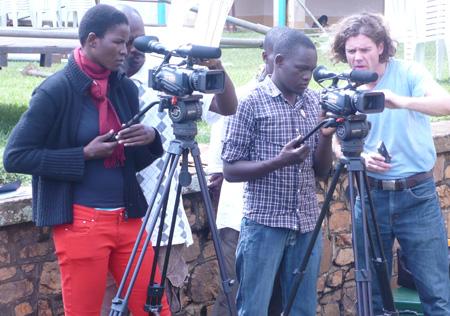"I have been greatly surprised of how well the young Ungandans have adapted from their lives in mud huts to the professional world of filmmaking," says Ulrik Krapper, CEO of Station Next.
The Danish film school for young people has organised film labs for 14-18-year-olds in Kampala and Gulu in collaboration with the local organisation, Maisha Film Lab. The Youth & Film Uganda development project is working to create a film culture in Uganda that gives young people an opportunity to watch, make and critically relate to film. The creative aspect has been overseen by Station Next, and according to Krapper, the workshops have been a great success so far.
"In many respects, young people in Uganda are just like Danish youngsters. Even though they don't have the same technical skills to begin with, they quickly pick up the process of filmmaking in the course of the week, and their films are in no way inferior," says Krapper.
Universal stories
"The stories they tell are fundamentally the same, with universal themes like family conflicts, bullying, and love triangles. They just tell them in their own context."
An example is the film "The Christmas Turkey" about a boy whose father has spent the money for the family's Christmas dinner on drinking. This prompts the boy to enter a football tournament where the prize for best player is a Christmas turkey. Most young people can probably identify with the issues of family conflicts, search for recognition, and fighting to win a competition.
"But few young Danes would regard winning a Christmas turkey a climax," Krapper laughs.
Colourful films
According to Krapper, though, Ugandan kids in some respects do have a different approach to storytelling than the young Danes he usually works with.
"They are less concerned with telling a well-rounded narrative than displaying funny characters and a thrilling football match, for example. Their acting is more flamboyant, and when we criticized them for overacting, they completely disagreed. The films are more colourful, resembling the style of Bollywood films. It's just another culture, and it has been great fun to experience their festivity," says Krapper.
Locally anchored
The goal for Station Next is to develop a concept that gradually will enable the local organisation, Maisha Film Lab, to take over the project. Next year, at the film lab in November, the Danish staff will increase their focus on training the local production managers and let them run the second week on their own.
"The project must be locally anchored to be meaningful. The key is to disseminate the pedagogical tools that enable the local production managers to teach the children a lot if skills within a short time. It's very exciting to see how it turns out," Krapper says.
Read about the project
The Youth & Film Uganda is supported by the Danish Film Institute and is part of a larger initiative organised and financed by the Danish Embassy in Kampala.
